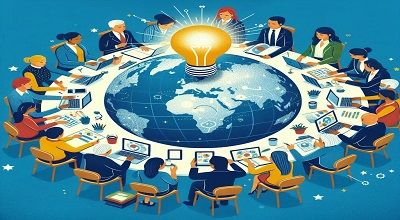Sustaining Professional Learning Communities
Sustaining Professional Learning Communities (PLCs) is crucial for ongoing teacher development, collaboration, and improvement in educational settings. PLCs are collaborative groups of educators who work together to analyze and improve their teaching practices. Here are some strategies to help sustain and enhance PLCs:
Leadership Support:
- Ensure strong administrative support for PLCs. Leaders should actively participate and demonstrate the importance of collaborative learning.
- Allocate time and resources for PLC activities within the school schedule and budget.
Clear Purpose and Goals:
- Define clear goals and purposes for the PLC. This helps members understand the value of their collaborative efforts.
- Align the goals of the PLC with school and district objectives, fostering a sense of collective responsibility.
Effective Communication:
- Establish open and transparent communication channels within the PLC. Encourage honest and constructive feedback.
- Utilize various communication tools, such as online platforms, to facilitate ongoing collaboration beyond face-to-face meetings.
Structured Meetings:
- Design PLC meetings with a clear structure and agenda. Ensure that meetings are focused and purposeful, and include time for reflection.
- Rotate leadership responsibilities among PLC members to promote shared ownership and commitment.
Data-Informed Decision Making:
- Use data to guide discussions and decisions within the PLC. Analyze student performance data, assessment results, and other relevant information.
- Encourage a culture of continuous improvement based on evidence and outcomes.
Professional Development Opportunities:
- Provide ongoing professional development opportunities for PLC members. This can include workshops, conferences, and access to relevant resources.
- Foster a culture of learning by encouraging PLC members to share their expertise and experiences with the group.
Celebrate Successes:
- Acknowledge and celebrate the achievements and successes of the PLC. Recognize the impact of collaborative efforts on student learning and teacher growth.
- Share success stories with the broader school community to inspire and motivate others.
Flexible Membership:
- Allow for flexibility in PLC membership. While consistency is important, occasional changes can bring fresh perspectives and ideas.
- Consider including support staff, specialists, and administrators in PLCs to promote a holistic approach to school improvement.
Long-Term Planning:
- Develop a long-term plan for the PLC, outlining milestones, assessments, and adjustments as needed.
- Align the PLC’s work with broader school improvement plans and initiatives.
Encourage Reflection:
- Build in time for reflection within the PLC. Encourage members to reflect on their teaching practices, the impact of their collaboration, and areas for growth.
Summary
By implementing these strategies, schools can create a sustainable and thriving environment for Professional Learning Communities, fostering a culture of continuous improvement and collaboration among educators.
